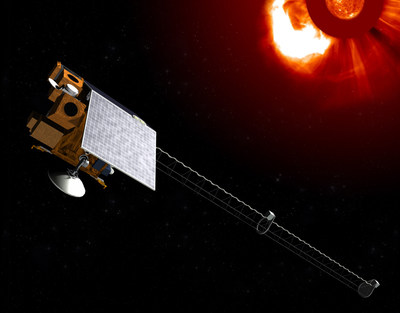Ball Aerospace Completes Critical Design Review of NOAA's Space Weather Monitoring Satellite
Rhea-AI Summary
On June 14, 2022, Ball Aerospace completed the critical design review (CDR) for NOAA's SWFO-L1 spacecraft. This spacecraft, expected to launch in 2025, will collect solar wind data to help forecast solar storm impacts. Ball's involvement includes production, integration, testing, and operational support for the satellite. The SWFO-L1 project builds on previous successes in weather monitoring technologies.
Dr. Makenzie Lystrup highlighted the spacecraft's significance in mitigating the effects of solar events on infrastructure and economy.
Positive
- Completion of CDR for SWFO-L1 spacecraft enhances credibility.
- Successful progress in meeting NOAA operational requirements.
- Launch planned for 2025 could lead to future contracts.
Negative
- Delays in launch could affect NOAA's operational monitoring capabilities.
- -
News Market Reaction 1 Alert
On the day this news was published, BALL declined 1.36%, reflecting a mild negative market reaction.
Data tracked by StockTitan Argus on the day of publication.
BROOMFIELD, Colo., June 14, 2022 /PRNewswire/ -- Ball Aerospace successfully completed critical design review (CDR) for the National Oceanic and Atmospheric Administration's (NOAA's) Space Weather Follow On-Lagrange 1 (SWFO-L1) spacecraft. Ball will now proceed with production, integration and test of the spacecraft.
Expected to launch in 2025, SWFO-L1 will collect solar wind data and coronal imagery to meet NOAA's operational requirements to monitor and forecast impacts from solar storm activity.
"The impacts of solar events such as coronal mass ejections can be significant, from knocking out communications satellites to disrupting the power grid," said Dr. Makenzie Lystrup, vice president and general manager, Civil Space, Ball Aerospace. "SWFO will be an important tool in NOAA's mission to monitor space weather, provide timely and accurate warnings, and help minimize the impact of these events on our infrastructure and economy."
Ball Aerospace was selected by NASA to design, build and integrate the small satellite for NOAA's SWFO-L1 mission in partnership with the NASA Goddard Space Flight Center. Ball will also perform satellite-level testing, help train the flight operations team, check-out the satellite in orbit and support mission operations. The SWFO-L1 mission builds on the success of Ball's spacecraft buses designed for operational weather missions like NOAA-20 and Suomi NPP, as well as high-performing small satellite missions like STPSats-2 and 3 and the Green Propellant Infusion Mission (GPIM).
Ball Aerospace is also building an operational environmental satellite for the U.S. Space Force Space and Missile Systems Center called the Weather System Follow-on – Microwave (WSF-M). WSF-M will host its own Energetic Charged Particle space weather sensor in addition to its primary instrument to measure ocean surface vector winds and tropical cyclone intensity.
Powered by endlessly curious people with an unwavering mission focus, Ball Aerospace pioneers discoveries that enable our customers to perform beyond expectation and protect what matters most. We create innovative space solutions, enable more accurate weather forecasts, drive insightful observations of our planet, deliver actionable data and intelligence, and ensure those who defend our freedom go forward bravely and return home safely. Go Beyond with Ball.® For more information, visit www.ball.com/aerospace or connect with us on Facebook or Twitter.
Ball Corporation (NYSE: BALL) supplies innovative, sustainable aluminum packaging solutions for beverage, personal care and household products customers, as well as aerospace and other technologies and services primarily for the U.S. government. Ball Corporation and its subsidiaries employ 24,300 people worldwide and reported 2021 net sales of
This release contains "forward-looking" statements concerning future events and financial performance. Words such as "expects," "anticipates," "estimates," "believes," and similar expressions typically identify forward-looking statements, which are generally any statements other than statements of historical fact. Such statements are based on current expectations or views of the future and are subject to risks and uncertainties, which could cause actual results or events to differ materially from those expressed or implied. You should therefore not place undue reliance upon any forward-looking statements and they should be read in conjunction with, and qualified in their entirety by, the cautionary statements referenced below. The company undertakes no obligation to publicly update or revise any forward-looking statements, whether as a result of new information, future events or otherwise. Key factors, risks and uncertainties that could cause actual outcomes and results to be different are summarized in filings with the Securities and Exchange Commission, including Exhibit 99 in our Form 10-K, which are available on our website and at www.sec.gov. Additional factors that might affect: a) our packaging segments include product capacity, supply, and demand constraints and fluctuations and changes in consumption patterns; availability/cost of raw materials, equipment, and logistics; competitive packaging, pricing and substitution; changes in climate and weather; footprint adjustments and other manufacturing changes, including the startup of new facilities and lines; failure to achieve synergies, productivity improvements or cost reductions; unfavorable mandatory deposit or packaging laws; customer and supplier consolidation; power and supply chain interruptions; changes in major customer or supplier contracts or loss of a major customer or supplier; inability to pass through increased costs; political instability and sanctions; currency controls; changes in foreign exchange or tax rates; and tariffs, trade actions, or other governmental actions, including business restrictions and shelter-in-place orders in any country or jurisdiction affecting goods produced by us or in our supply chain, including imported raw materials; b) our aerospace segment include funding, authorization, availability and returns of government and commercial contracts; and delays, extensions and technical uncertainties affecting segment contracts; c) the company as a whole include those listed above plus: the extent to which sustainability-related opportunities arise and can be capitalized upon; changes in senior management, succession, and the ability to attract and retain skilled labor; regulatory actions or issues including those related to tax, ESG reporting, competition, environmental, health and workplace safety, including U.S. FDA and other actions or public concerns affecting products filled in our containers, or chemicals or substances used in raw materials or in the manufacturing process; technological developments and innovations; the ability to manage cyber threats; litigation; strikes; disease; pandemic; labor cost changes; inflation; rates of return on assets of the company's defined benefit retirement plans; pension changes; uncertainties surrounding geopolitical events and governmental policies, including policies, orders, and actions related to COVID-19; reduced cash flow; interest rates affecting our debt; and successful or unsuccessful joint ventures, acquisitions and divestitures, and their effects on our operating results and business generally.
![]() View original content to download multimedia:https://www.prnewswire.com/news-releases/ball-aerospace-completes-critical-design-review-of-noaas-space-weather-monitoring-satellite-301567803.html
View original content to download multimedia:https://www.prnewswire.com/news-releases/ball-aerospace-completes-critical-design-review-of-noaas-space-weather-monitoring-satellite-301567803.html
SOURCE Ball Aerospace









